13 of the Most Popular Alternative Social Media Platforms
Marketers are fully aware that social media is evolving all the time, particularly as artificial intelligence advances.
The social networking market is anticipated to grow to 5.4 billion members by 2025 and reach a valuation of $183 billion by 2027, according to Statista. Marketers are looking for new channels to expand their strategy as social media keeps changing.
Let’s examine some of the most potential alternative social media platforms for 2025, ranging from networks that prioritize privacy to specialized hobby websites.
These social media sites have been grouped into seven main categories:
X substitutes include Threads, Bluesky, and Mastodon.
Facebook substitutes include Nextdoor.
Telegram is one of the instant messaging apps.
Apps for hobbies: Letterboxd and Strava
Apps that use images: BeReal, Lemon8, Locket
Apps for Audio: Discord
Membership Apps: Vero and Patreon
Pro Tip: Starting in February, don’t miss our four-part seminar on the Social Media Playbook 2025. Enroll right away!
Alternatives to X (Twitter)
Strong rivals to X are emerging from platforms like Threads, Bluesky, Mastodon, and True, each of which offers unique functionality and bridges the gaps created by the modifications made when X was owned by Elon Musk.
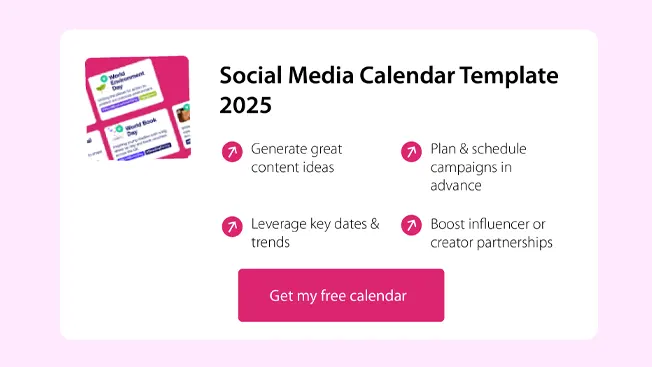
1) Threads
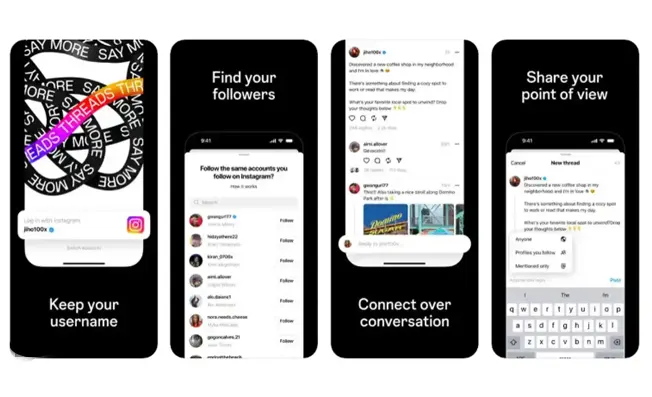
2) BlueSky
X co-founder Jack Dorsey founded Bluesky, a text-based microblogging site that revives the ease of use and user control of X’s early years while adding a contemporary, community-focused touch.
Bluesky operates independently of corporate control and provides complete transparency in its development and updates. Because of this dedication, the user base has grown quickly, rising from 9 million in September 2024 to 14.5 million by mid-November, especially following the U.S. elections.
With high-profile departures like The Guardian’s from X, the platform is gaining popularity among influencers, including journalists and celebrities, particularly in the wake of the mass “X exodus” that followed the U.S. elections.
Users who value niche communities, ad-free environments, and content control will find Bluesky appealing.
Users may compose 256-character posts, share photographs, respond, and interact just like they did on X thanks to its UI, which mimics the original X layout. But Bluesky goes one step further by providing algorithmic choice, robust content filters, and customisable feeds.
Bluesky, for example, is used by The New York Times to disseminate news articles and encourage interaction.

Marketing Opportunities – Without the interruptions of standard advertisements, Bluesky provides advertisers with a singular chance to interact with specific audiences, develop thought leadership, and foster genuine connections within targeted groups.
3) Mastodon
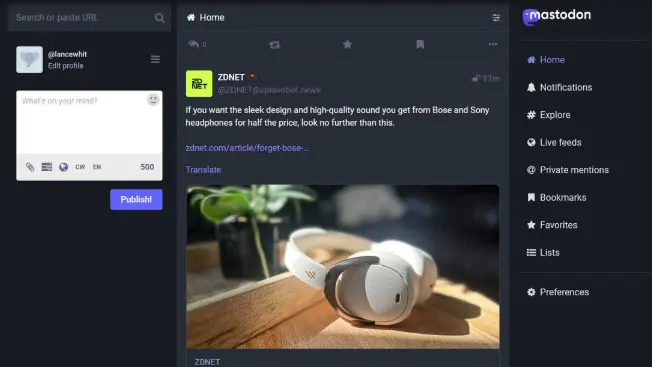
Alternatives to Facebook
The more personal, community-focused experience offered by Nextdoor and MeWe is ideal for people looking for an alternative to popular social networks. These platforms are perfect for firms that want to engage with consumers at the local level since they encourage genuine, localized connections.
4) NextDoor

Instant messaging apps
Apps for instant messaging have evolved to offer a platform for creating private, active communities in addition to safe communication. Telegram’s extensive capabilities and strong privacy protections make it stand out as one of the best options.
5) Telegram

Telegram has grown to be a popular option for users who are concerned about their privacy since its 2013 introduction. Telegram was established by VK’s founders, Nikolai and Pavel Durov, as a safer substitute for WhatsApp.
Telegram has changed its standards in spite of issues with how it handles user data and illicit activity on its network. others user data is now accessible to authorities thanks to recent revisions, however others claim this may not adhere to European legal requirements. Additionally, the app has collaborated with Germany to eliminate hate speech channels, and CEO Pavel Durov was jailed in France on charges of aiding criminal conduct.
With 950 million active users, Telegram appeals to tech-savvy, privacy-conscious people. Its great degree of control over personal data and adaptable features are valued by its audience. Telegram is a popular tool for safe, dependable communication as it keeps growing.
Along with features like “Secret Chat,” self-destructing messages, and cloud-based storage, the app provides end-to-end encryption for calls and chats, enabling users to view their chat history from any device.
Marketing Opportunities: Telegram Ads, which allow companies to send sponsored messages to channels with more than 1,000 subscribers, was just introduced by Telegram. These advertisements, which connect to a company’s Telegram channel or bot, are straightforward and uncomplicated in contrast to other platforms.
Hobby apps
6) Letterboxd
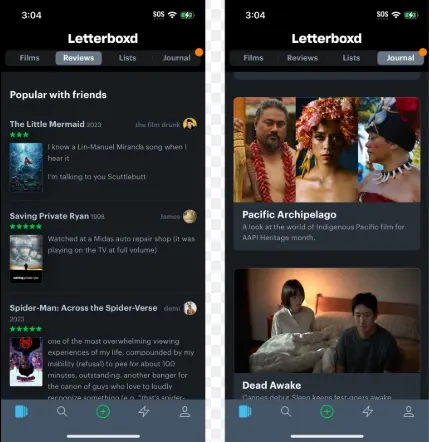
7) Strava
Originally developed in 2009 as a specialized platform for tracking miles for cyclists, Strava evolved during the epidemic into a well-known smartphone software that currently supports over 125 million athletes in a variety of sports as lockdowns pushed people outside.
By incorporating tools like group chats and texting, Strava has tapped into athletes’ need for connection and promoted communication among its vibrant user base.
By working with a number of companies, such as Brooks, Lululemon, and Chipotle, Strava generates beneficial marketing chances. The platform is perfect for marketers looking to promote products through partnerships, sponsorships, and athlete-focused campaigns because of its active, fitness-focused community.
By introducing challenges and segments that enticed users to participate after working out and offered the chance to win complimentary “Lifestyle Bowls,” Chipotle, for instance, used Strava to reach health-conscious customers.
The campaign increased Lifestyle Bowl sales by 20% and generated 700 million impressions on and off the site.
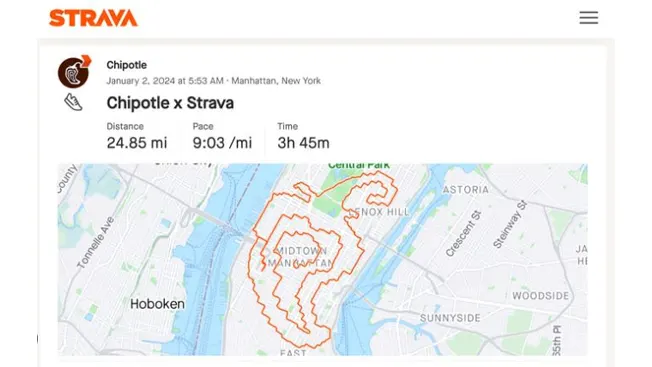
Marketing Opportunities: Hobby applications give advertisers access to audiences who are highly engaged and focused. Niche platforms like Strava and Letterboxd offer great chances for community-driven promotions, sponsorships, and direct interaction as more users move away from popular social networks.
Brands aiming to reach particular communities can develop marketing strategies that highlight connection, authenticity, and shared enthusiasm because users are pulled to these platforms by simil
Image-based apps
Apps that rely on images use eye-catching and pertinent images to draw users in, sway their opinions, and keep them interested. Photo-focused platforms like BeReal, Lemon8, and Locket connect like-minded people and build communities.
8) BeReal
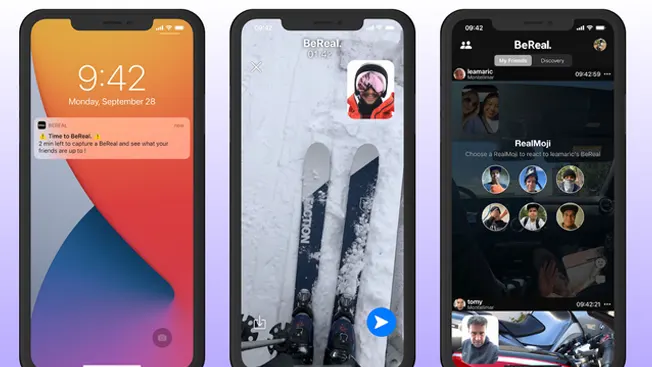
A social media app called BeReal urges users to snap a picture within two minutes after getting a random notification in order to share unprocessed, unfiltered moments. Without any filters or adjustments, it records a dual perspective using both the front and rear cameras. Users must share their own postings in order to read those of their friends, guaranteeing reciprocal engagement and promoting genuineness.
As of 2024, BeReal has about 23 million active monthly users, down from a record of 73.5 million in August 2022. The number of daily active users has increased dramatically, reaching over 25 million in April 2024, despite periodic oscillations. The app has solidified its position as the preferred platform for genuine, real-time sharing.
Marketing Opportunities: Brands have a rare chance to establish an authentic connection with customers thanks to BeReal’s emphasis on real, unedited content. Marketers must use innovation and genuine interaction in the absence of influencer culture and paid advertisements. Gen Z is especially drawn to the app’s strong emphasis on authenticity and mental health, which makes it an excellent tool for fostering loyalty and trust.
By embracing BeReal’s philosophy of unadulterated sincerity, brands may flourish there. Gaining and keeping followers can be facilitated by posting frequently, interacting with the community, and providing special offers or competitions.
9) Lemon8
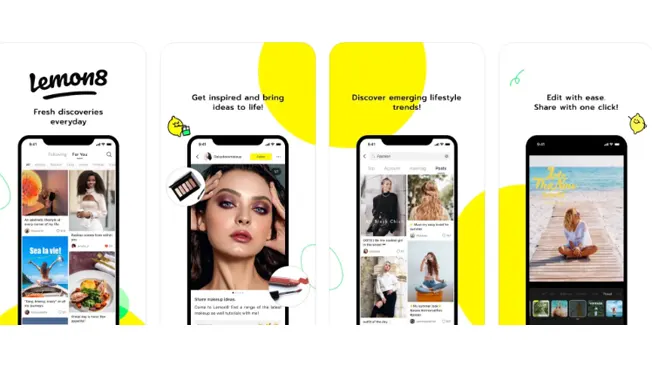
Lemon8, a visually-driven site that blends aspects of Instagram and Pinterest, was introduced in 2020 by TikTok founders and immediately garnered popularity. Lemon8’s board-style interface, which prioritizes images over videos, makes it the ideal place for content production and curation.
Users may effortlessly access the areas that interest them thanks to Lemon8’s organization of its material into seven lifestyle-focused tabs: Fashion, Beauty, Food, Wellness, Travel, Home, and All. Lemon8 prioritizes photos and longer captions over TikTok’s video-heavy stream, giving users more room for thorough product suggestions, directions, or even recipes.
Comparisons to traditional social networks have been made because of the platform’s distinctive content combination, which includes both product suggestions and influencer advertisements. Users who appreciate its editorial, lifestyle-focused tone are responding favorably to this mix of sponsored and organic content.
Recently, TikTok revealed that users can utilize a single account to access both Lemon8 and TikTok, allowing for easy cross-sharing between the two apps. In addition to providing users with more options to engage with their favorite influencers and find popular products across both apps, this connection enables producers to reach a wider audience.
Marketing Opportunities: Lemon8 has a lot of marketing potential even if it doesn’t currently have any ads. In order to take advantage of its creator-focused atmosphere, brands are already collaborating with influencers to showcase their goods in postings. Ads might be added in the future if the platform’s popularity keeps increasing, providing even more marketing chances.
10) Locket

With the help of the photo-sharing software Locket, users can transmit live photos straight to their loved ones’ home screens. Locket was first developed by Matt Moss as a cute side project for his fiancée, but it soon became well-liked, and Moss released it on the App Store in early 2022. More than 20 million people have downloaded the app since then, and more than a billion photographs have been shared by users.
Locket’s idea is straightforward: users invite contacts, who may subsequently customize their iPhone’s home screen with a widget. In order to provide a real-time stream of private moments away from the cacophony of public feeds, this widget shows live photographs as friends and family post them throughout the day. Users may maintain relationships with the individuals who are most important to them thanks to the completely private experience, which provides a more personal substitute for conventional social networking platforms.
Younger users and close-knit friend groups find Locket to be quite appealing since it provides a simple and private means of sharing unguarded moments without an audience.
Marketing Opportunities: At the moment, Locket does not have advertisements or sponsored content and instead concentrates on intimate sharing. However, as the app grows, lifestyle brands—particularly those focused on family or personal relationships—may have the chance to investigate non-intrusive methods of interacting with consumers in this intimate setting.
Audio Apps
Discord has changed from being a gaming-focused platform to a vibrant community center that serves a variety of interests. It makes it possible for marketers to organize participatory events, foster active communities, and establish more direct and intimate connections with audiences.
11) Discord

Discord is a flexible messaging app that allows friends and communities to communicate by combining text chat, voice, and video.
Users can interact with smaller groups or bigger, public communities centered around particular interests, such as well-known games like Fortnite and Minecraft, via the app’s private, invite-only servers. Its connectedness is further improved by its compatibility with other platforms like YouTube, Twitch, and Zapier.
Discord was founded in 2015 by Jason Citron and Stan Vishnevskiy with the goal of giving people a place to connect with others and feel like they belong, whether it be locally or internationally.
Discord has more than 200 million monthly active users and 563 million registered accounts. More than half of its users are between the ages of 25 and 34, with younger users between the ages of 16 and 24 coming in second.
Marketing possibilities: By building customized servers centered around business-related subjects, Discord provides businesses with exclusive marketing possibilities to interact with particular groups. Avatars, roles, and voice and video chat capabilities are all customisable on these servers. To improve the experience, visual components like stickers, GIFs, and pictures are essential. Brands can also use live events to engage directly with consumers and benefit from Discord’s Partner Program.
Membership Apps
12) Patreon
With the help of the monetization site Patreon, creators—including musicians, podcasters, painters, videographers, and more—can receive direct payments from their patrons, or followers. This assistance is provided on a project-by-project or regular basis.
Patreon, which was created as a membership platform, enables content providers to charge for their work. To engage with their audience, authors can easily create a customized Patreon page rather than developing a website and payment system.
With the recent launch of additional services like video creation, users of the platform pay a monthly fee to access unique content. Currently, Patreon has 250,000 creators, 8 million monthly active patrons, and has distributed $3.5 billion to creators.
Marketing Opportunities: Although the main goal of Patreon is to assist creators in making money off of their creations, businesses may still interact with the platform by collaborating with creators on influencer marketing initiatives. These campaigns could involve giving a creator’s Patreon audience access to exclusive discounts or product previews.
13) Vero

Here are thirteen great social media apps that you may not have used yet as part of your social media strategy.
Review your social media strategy before launching into a new platform. This will assist you in assessing how well the platform fits your target market and corporate objectives.
Additionally, before developing your brand presence on a platform, it’s usually a good idea to physically try it out.
